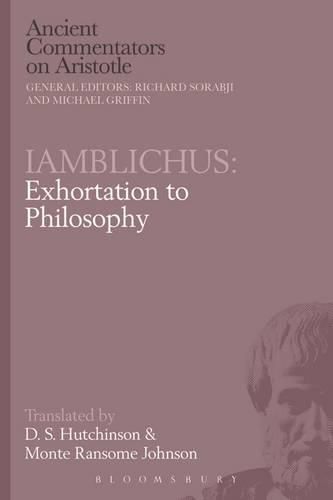Readings Newsletter
Become a Readings Member to make your shopping experience even easier.
Sign in or sign up for free!
You’re not far away from qualifying for FREE standard shipping within Australia
You’ve qualified for FREE standard shipping within Australia
The cart is loading…






The Protrepticus of Iamblichus (about AD 250-before 325), priestly reformer of Neoplatonism and commentator on Aristotle, is an exhortation to philosophy. The work combines the influences of Aristotle, Plato and Pythagoras, and is important both for revelations about these sources and for understanding Iamblichus’ philosophy in its own right. Whilst a significant portion draws on Aristotle’s earlier Protrepticus by excerpting elements of his lost text, other sections look to Plato and to Pythagoras’ Golden Verses and proverbs. By studying how Iamblichus presents passages from Plato, the translators are able to distinguish the verbatim citations from Aristotle, thus uncovering fragments of an otherwise lost Aristotelian work. The nature of Iamblichus’ enterprise is also demonstrated, which is to assemble excerpted portions from his chosen sources into intellectually satisfying parcels with headnotes expressing what the reader should think about them. It is therefore possible to understand more about how Iamblichus sees Aristotle and how he conceives of Aristotle’s place in the Platonic tradition and in the wider world of classical Greek philosophy. This English translation is the latest volume in the Ancient Commentators on Aristotle series and makes this philosophical work accessible to a modern readership. The translation is accompanied by an introduction, comprehensive commentary notes, bibliography, glossary of translated terms and a subject index.
$9.00 standard shipping within Australia
FREE standard shipping within Australia for orders over $100.00
Express & International shipping calculated at checkout
The Protrepticus of Iamblichus (about AD 250-before 325), priestly reformer of Neoplatonism and commentator on Aristotle, is an exhortation to philosophy. The work combines the influences of Aristotle, Plato and Pythagoras, and is important both for revelations about these sources and for understanding Iamblichus’ philosophy in its own right. Whilst a significant portion draws on Aristotle’s earlier Protrepticus by excerpting elements of his lost text, other sections look to Plato and to Pythagoras’ Golden Verses and proverbs. By studying how Iamblichus presents passages from Plato, the translators are able to distinguish the verbatim citations from Aristotle, thus uncovering fragments of an otherwise lost Aristotelian work. The nature of Iamblichus’ enterprise is also demonstrated, which is to assemble excerpted portions from his chosen sources into intellectually satisfying parcels with headnotes expressing what the reader should think about them. It is therefore possible to understand more about how Iamblichus sees Aristotle and how he conceives of Aristotle’s place in the Platonic tradition and in the wider world of classical Greek philosophy. This English translation is the latest volume in the Ancient Commentators on Aristotle series and makes this philosophical work accessible to a modern readership. The translation is accompanied by an introduction, comprehensive commentary notes, bibliography, glossary of translated terms and a subject index.